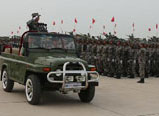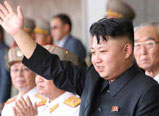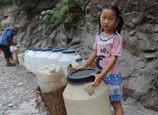
HAVANA, July 28 (Xinhua) -- Peace talks between the Armed Revolutionary Forces of Colombia (FARC) and the government resumed Sunday in Havana, with the negotiating sides exchanging accusations.
Following a 19-day recess, the 12th round of negotiations aimed at ending five decades of fighting between the armed leftist rebels and the government got underway again to tackle the second issue of a five-point agenda: laying the groundwork for the rebels ' transition from armed struggle to a political party or movement.
But head government negotiator Humberto de la Calle complained to reporters just before the session began that the FARC was using the dialogues as a forum for its ideas.
"I want to remind everyone why we are here in Havana talking: this is not a process of talks for the FARC to do politics, but to reach an agreement on the end of the conflict," De la Calle said, reading from a written statement.
"If we reach a final accord, then they can do politics, without weapons, in a democracy, once they have demobilized," the former president said, calling on the rebels to try and make progress towards a peace deal.
De la Calle said the government has pledged to fulfill the stipulations of a final deal to radically change the nation's rural and agrarian reality by promoting equity and democracy in the countryside.
The rebels, meanwhile, highlighted the condition of Colombia's rural workers by criticizing the government's handling of ongoing protests in the farming community of Catatumbo that have now entered their 46th day.
"It wouldn't do any good to talk in Havana about limiting land holdings, putting a stop to the sale of land to foreign interests, regularizing land ownership in favor of the poor and of national sovereignty, if the government turns the agreements into empty words that are gone with the wind," rebel delegate Andres Paris said.
Paris, also reading from a statement to the press prior to the session, said it was evident from the way the government of President Juan Manuel Santos is treating the protesting residents, that "it has no interest in defending the rights of poor farmers, but only of protecting the sacred rights of capital."
The two sides, which entered talks in November 2012, have so far reached an agreement on the first of five main points, land reform and rural development.
Other issues remaining to be debated include the rebels' ties to drug trafficking, disarming and reparations for the victims of the fighting.
















 Working under 40 degrees Celsius
Working under 40 degrees Celsius


![]()
